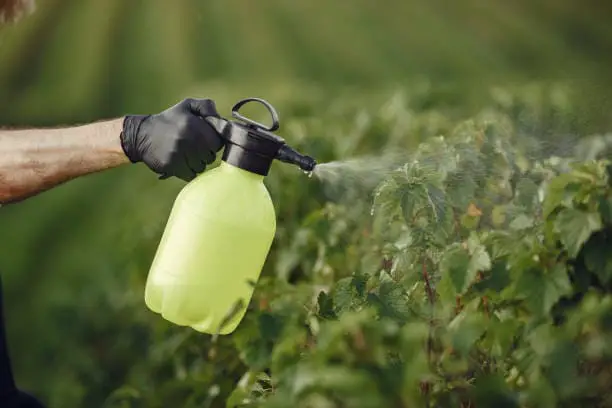Pesticides are an essential part of any organic gardener’s toolkit. They help protect plants from pests and diseases and can be a lifesaver when things get out of control. However, commercial pesticides can be expensive and many of them contain harmful chemicals. There are many safe, effective, and affordable ways to make your own pesticides. In this blog post, we’ll teach you how to make various types of pesticides using ingredients that you probably already have in your home.
Table of Contents
Neem Oil As Natural Pesticide
Neem oil is a natural pesticide that is extracted from the neem tree. It’s safe to use around children and pets, and it’s effective against a wide range of pests, including Aphids, Whiteflies, Caterpillars, Mealybugs, Scale insects, and Thrips.
To make a neem oil pesticide, you will need:
- One tablespoon of neem oil
- One tablespoon of liquid soap
- One liter of warm water
Instructions:
- Combine the ingredients in a spray bottle and shake well.
- Spray the mixture on the affected plants, making sure to coat the underside of the leaves.
- Repeat every few days until the pests are gone.
When you want to spray your plant, using a freshly prepared combination is always the best option. A combination of these compounds, on the other hand, has an eight-hour shelf life.
Diatomaceous Earth
Diatomaceous earth is a white powder that is made from the fossilized remains of tiny aquatic creatures called diatoms. It’s safe to use around children and pets, and it’s effective against a wide range of pests, including ants, cockroaches, fleas, ticks, and spiders.
To make a diatomaceous earth pesticide, you will need:
- One cup of diatomaceous earth. You can get this in garden stores
Instructions:
Simply sprinkle the diatomaceous earth around the perimeter of your home or wherever you’ve seen pests or at the base of your plants. You can also put it in a jar with holes punched in the lid and place it where you’ve seen pests.
The powder will kill the pests by dehydrating them.
You’ll need to reapply after it rains or when the powder gets wet.
Homemade Garlic Spray
Garlic is a common ingredient in many homemade pesticides. It’s effective against Aphids, Japanese Beetles, Caterpillars, and other soft-bodied insects. A lot of people say the strong offensive smell that garlic gives is what keeps the pests away. This will mean this homemade spray is more of a pests repellant.
To make a garlic spray pesticide, you will need:
- Two bulbs garlic
- One tablespoon of dish soap
- Half cup of vegetable oil
- One pint of water
Instructions:
- Peel garlic and blend/ puree with water and oil in a food processor
- Let the mixture sit and settle overnight
- Strain the mixture into a container
- Add the liquid soap and mix very well
- Pour the mixture into a spray bottle.
- Spray on the affected plants, making sure to coat the underside of the leaves.
The mixture will last for up to two weeks in the fridge, just make sure to give it a good shake before using.
After two weeks, it needs to be replaced.
Tomato Leaves
Tomato leaves are effective against Aphids, Whiteflies, and Caterpillars. Tomato leaves contain compounds that are toxic to many pests but are safe for humans and animals.
To make a tomato leaf pesticide, you will need:
- One pound of fresh tomato leaves
- One quart of water
Instructions:
- Chop the tomato leaves and add them to a pot of boiling water.
- Let the mixture simmer for 30 minutes.
- Let it cool and strain the liquid into a spray bottle.
- Spray the mixture on the affected plants, making sure to coat the underside of the leaves.
- Repeat every few days until the pests are gone.
You can also add a teaspoon of liquid soap to help the mixture stick to the leaves better.
Pepper Spray
Pepper spray is effective against many pests, including Aphids, Whiteflies, Caterpillars, and Mealybugs. You can use different types of pepper e.g chili, black, or cayenne.
To make a pepper spray pesticide, you will need:
- Three tablespoons of any type of pepper powder
- One cup of water
- One tablespoon of oil
- One tablespoon of dish soap
Instructions:
- Add the pepper to boiling water and let it steep for 30 minutes.
- Strain the mixture and add the oil and dish soap.
- Pour the mixture into a spray bottle and shake well.
- Spray the mixture on the affected plants, making sure to coat the underside of the leaves.
- Repeat every few days until the pests are gone.
You should dilute this mixture with water before using it.
Soap Spray
Soap spray is effective against Aphids, Whiteflies, and Caterpillars. It works by suffocating the pests.
To make a soap spray pesticide, you will need:
One tablespoon of dish soap
One cup of water
Instructions:
- Mix the soap and water together in a spray bottle.
- Spray the mixture on the affected plants, making sure to coat the underside of the leaves.
- Repeat every few days until the pests are gone.
You can also add a teaspoon of pepper powder to help deter the pests.
Citrus Peels
Citrus peels contain a compound called limonene, which is effective against Aphids, Whiteflies, Caterpillars, and Mealybugs.
To make a citrus peel pesticide, you will need:
The peels of two oranges or lemons
One quart of water
Instructions:
- Boil the peels in water for 30 minutes.
- Let it cool and strain the liquid into a spray bottle.
- Add oil and liquid soap.
Spray the mixture on the affected plants, making sure to coat the underside of the leaves.
Repeat every few days until the pests are gone.
Oil-Based Pesticide.
Oil-based pesticides are effective against Aphids, Whiteflies, Caterpillars, and Mealybugs. It is one of the most used homemade pesticides.
To make an oil-based pesticide, you will need:
- One cup of any type of oil
- One tablespoon of dish soap
- Water
Instructions:
- Mix the oil and dish soap together in a spray bottle.
- Add water and shake well.
- Spray the mixture on the affected plants, making sure to coat the underside of the leaves.
- Repeat every few days until the pests are gone.
Mixed Vegetable Spray.
In this version of homemade pesticide, you are using various kitchen ingredients such as garlic, onion, and peppers which pests find repulsive. This makes an effective pesticide.
To make a mixed vegetable spray, you will need:
- One minced onion
- One minced garlic bulb
- One teaspoon of cayenne pepper
- One quart of water
- One tablespoon oil
- one tablespoon dish soap.
Instructions:
- Mix all the ingredients in a food processor or blender.
- Let it cool and strain the liquid into a spray bottle.
Spray the mixture on the affected plants, making sure to coat the underside of the leaves.
Repeat every few days until the pests are gone.
Benefits of Using Homemade Pesticides.
Homemade pesticides have a number of benefits over store-bought pesticides.
- They are usually cheaper and more effective,
- Safer for the environment.
- You can tailor them to your specific needs by using different ingredients.
- They are easy to make and don’t require any special equipment.
There are a number of different ways to make homemade pesticides. We advise that you wait a day or two before eating or harvesting any plant you have sprayed pesticides on. This is because the smell and maybe taste of these pesticides can linger on the plant. If you are pregnant, nursing, or have any other health concerns, please consult a doctor before using homemade pesticides.




